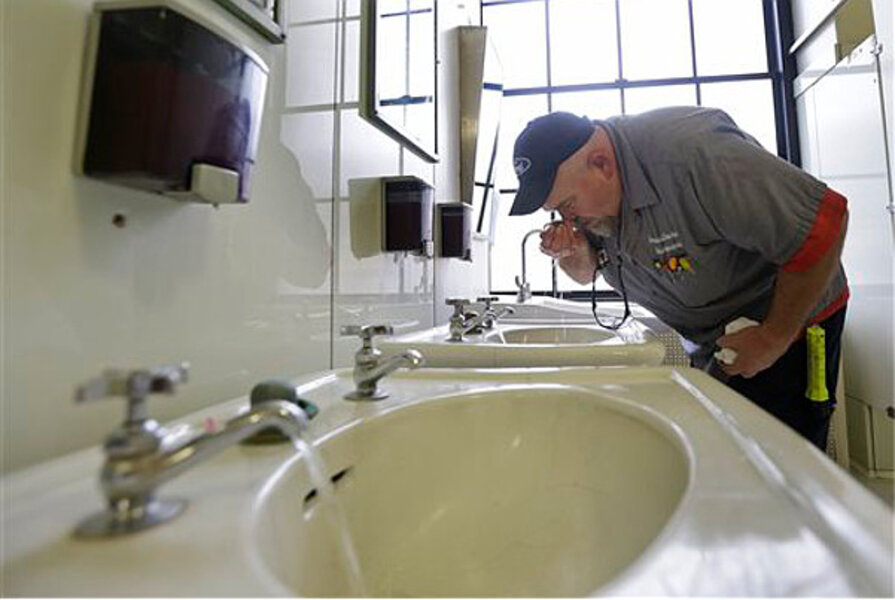Is West Virginia's tap water drinkable yet?
Loading...
| CHARLESTON, W.Va.
Downtown businesses and restaurants reopened Tuesday following last week's chemical spill, but many people waited yet another day for officials to tell them their tap water was safe.
So far, about 39 percent of West Virginia American Water's customers have been allowed to use their water again after a chemical spilled into the Elk River on Thursday, state officials said.
More than 200 restaurants have reopened where the ban has been lifted, said Amy Shuler Goodwin, a spokeswoman for Gov. Earl Ray Tomblin, and all hospitals but one had running water by Tuesday, Tomblin said. The exception was Boone Memorial Hospital in Madison, the governor said.
There were still some areas on the edges of the water system with chemical levels exceeding the acceptable amount, said West Virginia National Guard Adjutant Gen. James A. Hoyer.
Schools in all four counties in the affected areas were to remain closed Wednesday, Tomblin said. He did not provide a timeline for school to resume.
The emergency closed schools, restaurants and businesses because they, along with about 300,000 residents, were told not to drink, shower or even wash clothes with the contaminated water.
Matthew Davis said his neighborhood was still waiting for the ban to be lifted. After rinsing off at a nearby creek last week, he finally enjoyed a hot shower Tuesday at his fiancee's house 30 minutes away.
Davis, 21, had his wisdom teeth removed just before the water ban.
"Pretty much all I had was Coke, and that hurt," Davis said.
Officials cautioned that even water that was deemed safe may still have a slight licorice-type odor, raising the anxieties of some.
Beverly Farrow also took a shower for the first time Tuesday morning after nearly five days without water.
She got the call Monday night from the water company saying it was OK to flush the water systems.
"I thought, 'Oh my gosh, here we go,' and all of the faucets went on. Of course, I have not brushed my teeth or rinsed my mouth with the water yet, I'm still kind of waiting on that."
Bobbi Holland, another Edgewood resident, went to wash her face Monday night after flushing out her system.
"It smelled stronger than ever and I was like, 'Oh no,' but I thought, 'I'm tired, I'm just going to bed.' But when I woke up this morning, there wasn't any odor," she said Tuesday.
Water distribution stations continued to hand out water and the water company said it could be days before the entire system is back. Officials lifted the ban in a strict, methodical manner to help ensure the water system was not overwhelmed.
The water crisis started Thursday when a chemical used in coal processing leaked from a Freedom Industries plant into the nearby Elk River.
Complaints came in to West Virginia American Water about an odor and officials discovered the chemical 4-methylcyclohexane methanol was leaking out of a 40,000-gallon tank.
Federal authorities, including the U.S. Chemical Safety Board, have opened an investigation.
Only 14 people exposed to the contaminated water were admitted to the hospital, and none were in serious condition.
The chemicals removed from Freedom Industries' Elk River site have been shipped to another facility that the company owns, said Jimmy Gianato, state Department of Homeland Security director.
The facility is in nearby Nitro, not near a water source, Gianato state officials said late Tuesday.
Environmental activist Erin Brockovich came to Charleston after she said she received thousands of online requests to visit and look into the spill. Brockovich said she believes officers from the company responsible for the spill should face criminal charges.
"It would've cost so much less to identify the leak, report the leak, fix the leak, instead of ignore the leak. This is going to be hundreds of millions of dollars," she said.
Associated Press writers Pam Ramsey, Brendan Farrington, Mitch Weiss and Dylan Lovan contributed to this report.
Copyright 2014 The Associated Press. All rights reserved. This material may not be published, broadcast, rewritten or redistributed.







